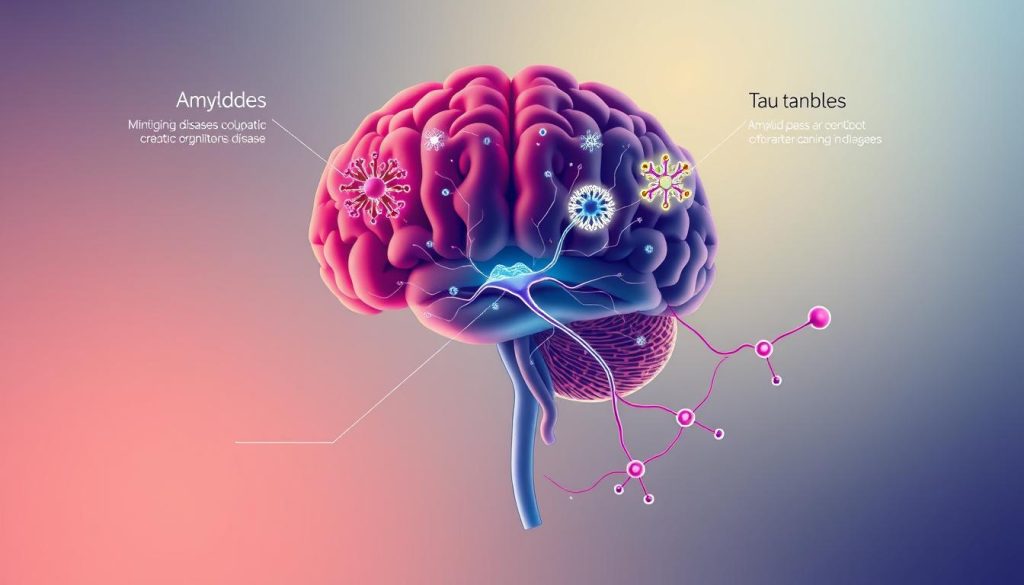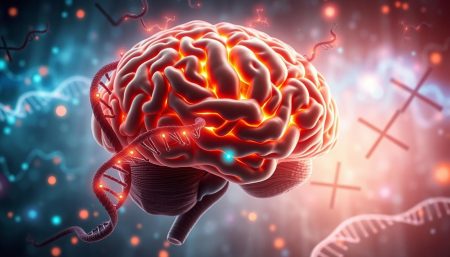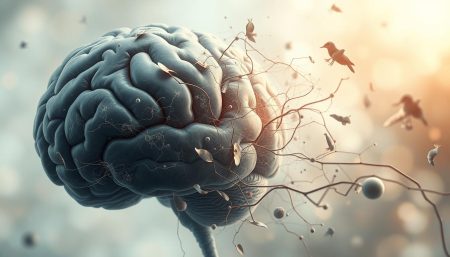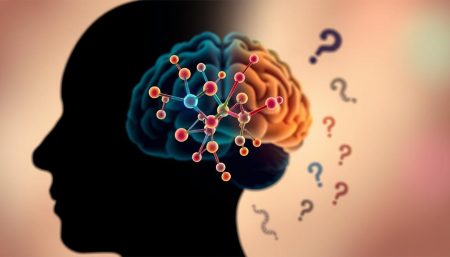Understanding Alzheimer’s disease is key, yet it’s complex. It involves genetics, environment, and lifestyle. What causes Alzheimer’s disease affects many. This guide aims to bring clarity and hope, whether you’re looking into Alzheimer’s disease prevention or Alzheimer’s caregiving.
The many factors that lead to Alzheimer’s can be overwhelming. But, knowing the causes gives us hope. It helps us find ways to prevent it and find new treatments. This journey is about empathy, touching the lives of patients and caregivers.
Key Takeaways
- Understanding the causes of Alzheimer’s disease is crucial for families.
- Looking into prevention is key for Alzheimer’s disease prevention.
- Genetics play a big role, leading to personalized care.
- Environmental factors and lifestyle choices are important for research and intervention.
- Supporting Alzheimer’s caregiving is vital for everyone’s well-being.
- Science keeps exploring, promising new treatments in the future.
Understanding Alzheimer’s Disease and Its Impact
Alzheimer’s disease is a serious brain disorder that affects many people. It changes lives for the worse. Knowing the signs early and understanding the stages can help manage it better.
Defining Alzheimer’s Disease
Alzheimer’s disease causes memory loss and confusion. It makes everyday tasks hard. As it gets worse, it can severely damage the brain.
The Global Burden of Alzheimer’s Disease
Alzheimer’s disease affects millions worldwide. It also costs societies a lot of money. The financial strain is huge, with billions spent each year.
| Country | Estimated Cases (millions) | Yearly Economic Impact (billions USD) |
|---|---|---|
| United States | 5.8 | 290 |
| United Kingdom | 0.85 | 26 |
| China | 9.5 | 167 |
| Brazil | 1.2 | 3.2 |
Knowing the risks and raising awareness can help. Better diagnosis and care can improve lives. It helps those with Alzheimer’s and their caregivers too.
Early Signs and Alzheimer’s Disease Symptoms
Spotting the early signs of Alzheimer’s disease is key to managing it well. Finding it early can make treatments more effective and improve life quality. We’ll look at common symptoms that might signal Alzheimer’s, stressing the need for early alzheimer’s disease diagnosis.
- Memory loss that disrupts daily life
- Challenges in planning or solving problems
- Difficulty completing familiar tasks at home, at work, or at leisure
- Confusion with time or place
- Trouble understanding visual images and spatial relationships
- New problems with words in speaking or writing
- Misplacing things and losing the ability to retrace steps
- Decreased or poor judgment
- Withdrawal from work or social activities
- Changes in mood and personality
Seeing these symptoms means it’s time to see a doctor. They can talk about alzheimer’s disease diagnosis and alzheimer’s disease treatment options.
Early detection of Alzheimer’s disease can significantly moderate the progression of symptoms and improve living standards.
This overview helps with early medical help and family planning. Knowing these symptoms is the first step towards diagnosis and care. It’s vital for managing Alzheimer’s disease.
Genetic Factors in Alzheimer’s Disease
Looking into the genetics of Alzheimer’s disease helps us understand why some people might be more at risk. Today’s alzheimer’s disease research has made big strides in figuring out how genes play a part. It has highlighted certain alzheimer’s risk factors.
Hereditary Risks
Genetics and Alzheimer’s risk are closely linked. Some genes can make a person more likely to get the disease. Familial Alzheimer’s disease (FAD) is caused by specific gene mutations. It leads to symptoms appearing earlier in life.
Identifying Genetic Markers
Scientists are working hard to find genetic markers for Alzheimer’s. These markers could be like early warning signs. Finding them is key to preventing or delaying symptoms.
| Gene | Association with Alzheimer’s |
|---|---|
| APOE ε4 | Significantly increases risk |
| APP | Linked to early-onset Alzheimer’s |
| PSEN1 | Involved in familial Alzheimer’s disease cases |
| PSEN2 | Rare mutations associated with Alzheimer’s |
Many alzheimer’s disease research studies show the value of genetic screening. Knowing about these genetic markers helps doctors tailor treatments. This could change how we treat Alzheimer’s disease.
Environmental Influences on Alzheimer’s Risk
Our environment plays a big role in our health, especially when it comes to Alzheimer’s risk factors. New studies show how different environmental exposures can affect our chances of getting Alzheimer’s. This makes us think more about Alzheimer’s disease prevention based on our surroundings.
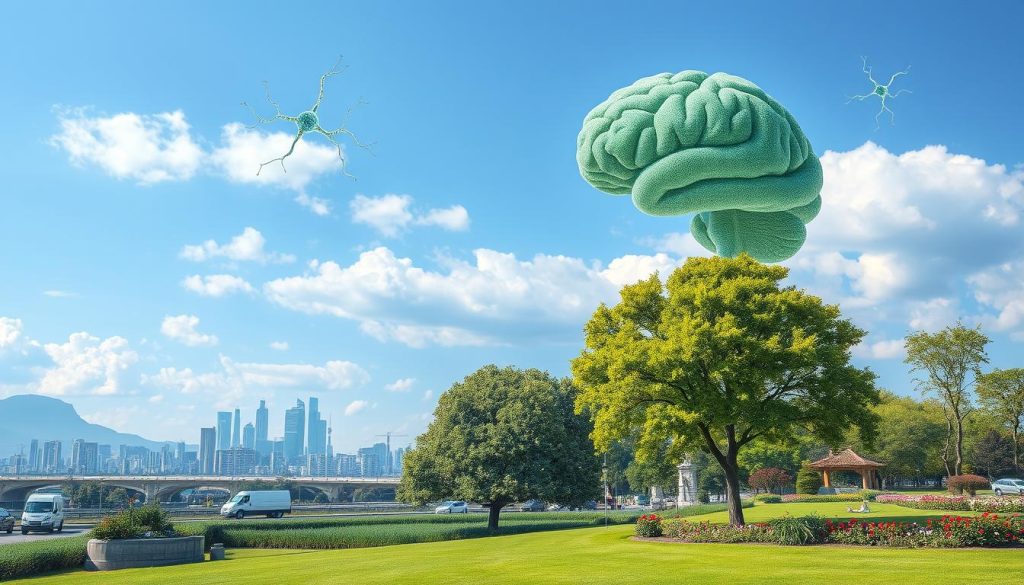
Things like air quality, heavy metals, and urban living levels are important. We need to know how to handle these to lower Alzheimer’s risk. For example, research suggests living in cleaner air areas is key to preventing Alzheimer’s. This is part of a bigger Alzheimer’s disease prevention plan.
| Environmental Factor | Risk Contribution | Possible Interventions |
|---|---|---|
| Air Pollution | High | Implementing air purifying systems, advocating for cleaner emissions in communities |
| Heavy Metals Exposure | Moderate to High | Using water filters, avoiding contaminated sites |
| Lack of Green Spaces | Moderate | Creating and promoting access to public parks, personal gardening |
By making these changes in our homes and communities, we can lower Alzheimer’s risk factors. Taking care of our environment is a big part of preventing Alzheimer’s. It’s important to do this along with other healthy habits.
Lifestyle Choices and Alzheimer’s Disease Prevention
There are many ways to prevent Alzheimer’s disease. Diet, exercise, and keeping your mind active are key. These steps not only lower the risk of Alzheimer’s but also improve your overall health.
Diet and Nutritional Considerations
Good nutrition is vital for brain health and preventing Alzheimer’s. Foods high in omega-3s, antioxidants, and vitamins are important. The Mediterranean diet, with its focus on fruits, vegetables, fish, nuts, and oils, is especially beneficial.
Exercise and Brain Health
Exercise is a major part of preventing Alzheimer’s. It helps the brain stay connected and make new connections. Studies show that 150 minutes of moderate to vigorous exercise a week can boost brain function and lower Alzheimer’s risk.
Intellectual Engagement and Social Interaction
Keeping your mind active and staying socially connected can also help. Activities like reading, playing music, solving puzzles, and talking with others strengthen your brain. This can help reduce the risk of Alzheimer’s.
| Lifestyle Factor | Benefits | Examples |
|---|---|---|
| Diet | Provides essential nutrients that protect brain health | Mediterranean diet, high in fruits, vegetables, fish |
| Exercise | Enhances cognitive function and maintains connectivity in the brain | Aerobic activities like walking, cycling, swimming |
| Intellectual Engagement | Builds and maintains cognitive reserves | Puzzles, reading, learning a new language or skill |
| Social Interaction | Stimulates cognitive processes and reduces stress levels | Community participation, regular communication with friends and family |
The Role of Age in Alzheimer’s Disease
Understanding how age affects Alzheimer’s disease is key. It’s a major alzheimer’s risk factor. As people get older, the chance of getting Alzheimer’s goes up a lot, especially in later years. This shows why caring for the elderly and preventing the disease are so important.

Getting older not only raises the risk but also makes the disease worse. Older brains are more likely to get Alzheimer’s because of changes in their structure. This part looks at how age affects Alzheimer’s through data, making the connection clearer.
| Age Range | Percentage at Risk | Common Stages Observed |
|---|---|---|
| 65-74 | 3% | Early Stage |
| 75-84 | 17% | Middle Stage |
| 85+ | 32% | Late Stage |
This table shows how the risk and severity of alzheimer’s disease stages grow with age. It points out the need for special care and support for the elderly. Such efforts could slow the disease’s progress and enhance life quality, making age a key factor in managing Alzheimer’s risks and care.
What Causes Alzheimer’s Disease: Exploring the Known
The search for answers about Alzheimer’s disease is ongoing. It delves into the complex world of brain degeneration at its heart. Research has found key parts of the disease that lead to memory loss and thinking problems.
Neurofibrillary Tangles and Amyloid Plaques
Neurofibrillary tangles and amyloid plaques are at the center of Alzheimer’s research. These protein clumps mess with brain function. Amyloid plaques form outside nerve cells, while tangles twist inside them.
This buildup is linked to memory and thinking problems seen in Alzheimer’s.
The Breakdown of Neural Connections
Alzheimer’s also causes the breakdown of brain connections. This makes it hard for the brain to handle and remember information. The loss of these connections leads to a decrease in brain size and disrupts neural paths.
Understanding these changes is key to finding treatments. It could help keep or fix these connections in the brain.
In summary, studying Alzheimer’s helps us understand this complex disease. With ongoing research, there’s hope for finding effective treatments one day.
Delving into Alzheimer’s Disease Stages
Understanding Alzheimer’s disease stages is key to better managing the disease. It helps in improving alzheimer’s disease prevention efforts. This section will walk you through the stages, stressing the need for early alzheimer’s disease symptoms recognition.
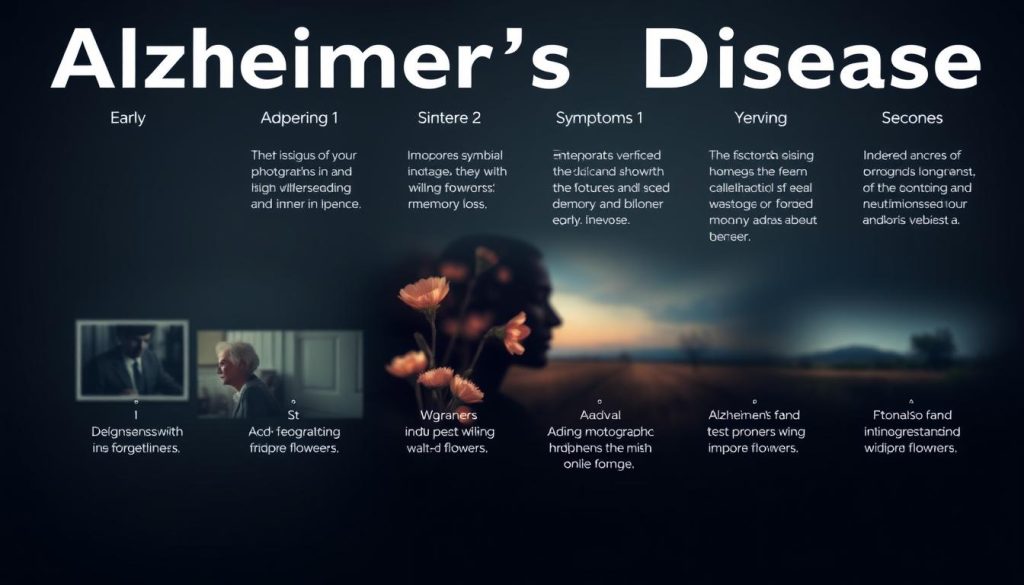
The journey starts in the preclinical phase, where brain changes occur before symptoms show. Early detection here is crucial for prevention. It encourages those at risk to live healthier and delay symptoms.
The mild cognitive impairment stage shows subtle memory and thinking changes. These changes start to affect daily life and decision-making. It’s a critical time for treatment.
- Increased forgetfulness
- Challenges in problem-solving
- Difficulty with complex tasks like managing finances
The moderate stage brings more obvious challenges, needing full caregiving support. Daily activities become harder, and significant help is needed. Early recognition can slow the disease and keep quality of life high.
| Stage | Key Symptoms | Prevention and Management Tips |
|---|---|---|
| Early | Forgetfulness, losing track of time | Engage in mental and social activities |
| Middle | Confusion, mood changes | Maintain a structured routine, improve home safety |
| Late | Severe memory loss, physical decline | Enhanced caregiving, personalized patient care |
In the advanced stages, symptoms are severe, causing deep memory loss and physical decline. Care at this stage focuses on compassion and dignity. Prevention efforts earlier in life are crucial in reducing this stage’s impact.
Each stage of Alzheimer’s builds on the last, presenting challenges and opportunities. A caring, informed approach can manage symptoms, keeping those affected independent and well for longer.
Investigating Alzheimer’s Disease Treatment Options
Exploring alzheimer’s disease treatment involves looking at current medicines and new therapies. These efforts help manage symptoms and pave the way for future breakthroughs in alzheimer’s disease research.
Current Medications and Therapies
Today, we have various treatments to help with Alzheimer’s symptoms. These include medicines like cholinesterase inhibitors and memantine. They work by boosting brain chemicals, which can slow down cognitive loss.
Therapies like cognitive behavioral therapy and rehabilitation programs also play a role. They help patients keep their skills and abilities for longer.
Experimental Treatments and Trials
Scientists are always looking for new treatments in alzheimer’s disease research. They focus on tackling amyloid plaques, tau protein tangles, and brain inflammation. These are key factors in Alzheimer’s disease.
| Treatment Category | Description | Research Status |
|---|---|---|
| Amyloid Beta Targeting | Drugs designed to reduce amyloid build-up in the brain. | Several in phase III clinical trials |
| Tau Protein Addressing | Therapies for dissociating Tau tangles, which are also known to deteriorate cognitive functions. | Early stage research and phase I trials |
| Neuroinflammation Control | Uses anti-inflammatory compounds to curtail brain inflammation linked to disease progression. | Experimental stages and lab testing |
These efforts in alzheimer’s disease treatment and research offer hope for better management and a cure. It’s crucial for those affected and their families to stay updated on these developments.
Effective Alzheimer’s Disease Diagnosis Techniques
Diagnosing Alzheimer’s disease is complex. It’s influenced by spotting early symptoms. Knowing how to diagnose Alzheimer’s helps doctors choose the best treatments.
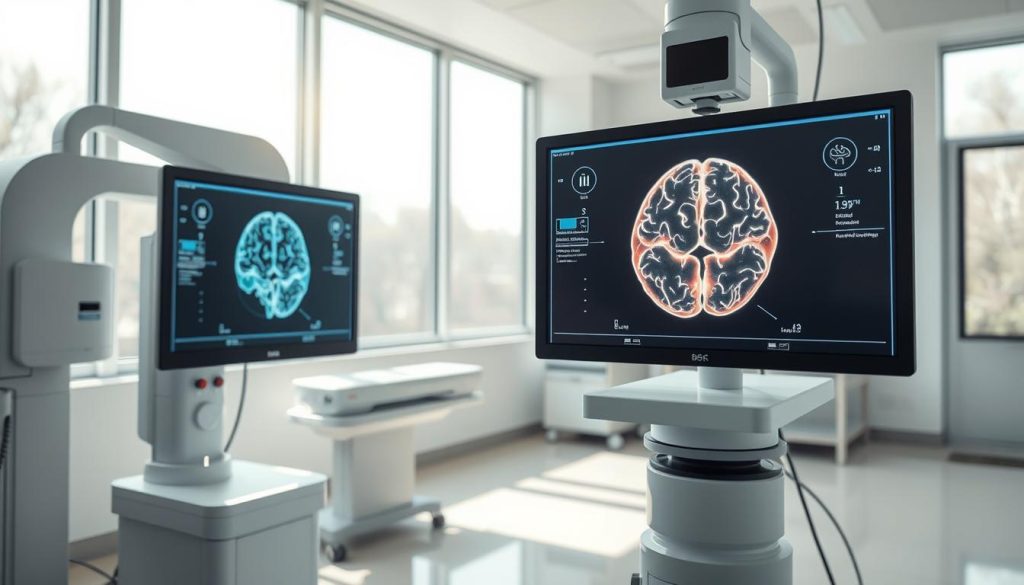
Alzheimer’s starts quietly, with memory issues seen as aging. But, early and correct diagnosis helps manage the disease. So, many effective tests are now used to find the disease quickly.
- Cognitive and Memory Tests: These tests check thinking, reasoning, and memory. They’re key in seeing how cognitive decline affects daily life.
- Neurological Examination: This exam tests reflexes, muscle tone, speech, and sensation. It helps rule out other diseases and confirm Alzheimer’s.
- Brain Imaging: MRI and CT scans help rule out other conditions. PET scans show amyloid plaques, a key sign of Alzheimer’s.
- Genetic Testing: This test is less common but can be helpful for those with a family history of Alzheimer’s.
Using these tools together is crucial. They give different views that together show a patient’s brain health. Spotting Alzheimer’s symptoms early and using detailed diagnosis methods improves care and treatment results.
These tools also help in Alzheimer’s research. They support the development of new treatments and improve existing ones. This helps fight the disease more effectively.
Scientific Advances in Alzheimer’s Disease Research
Recently, research on Alzheimer’s has made big steps forward. This is especially true for biomarkers and brain imaging. These breakthroughs help us understand the disease better. They also lead to more effective treatments.
Biomarkers and Brain Imaging
Biomarkers have changed how doctors deal with Alzheimer’s. Biomarkers are signs in blood or cerebrospinal fluid that show disease presence or risk. With tools like PET scans and MRI, we can see the brain’s health. This means we can diagnose Alzheimer’s earlier and more accurately.
The Search for a Cure
Finding a cure for Alzheimer’s is a key goal of research. Today’s treatments mainly manage symptoms. But, combining biomarker research with advanced imaging could lead to treatments that attack the disease’s causes. This teamwork between diagnosis and treatment offers hope to millions worldwide.
Alzheimer’s Brain Changes Throughout Progression
Understanding how Alzheimer’s changes the brain is key for doctors and caregivers. Knowing how brain changes relate to the disease’s stages helps us see what patients go through. This knowledge is crucial for managing the disease.
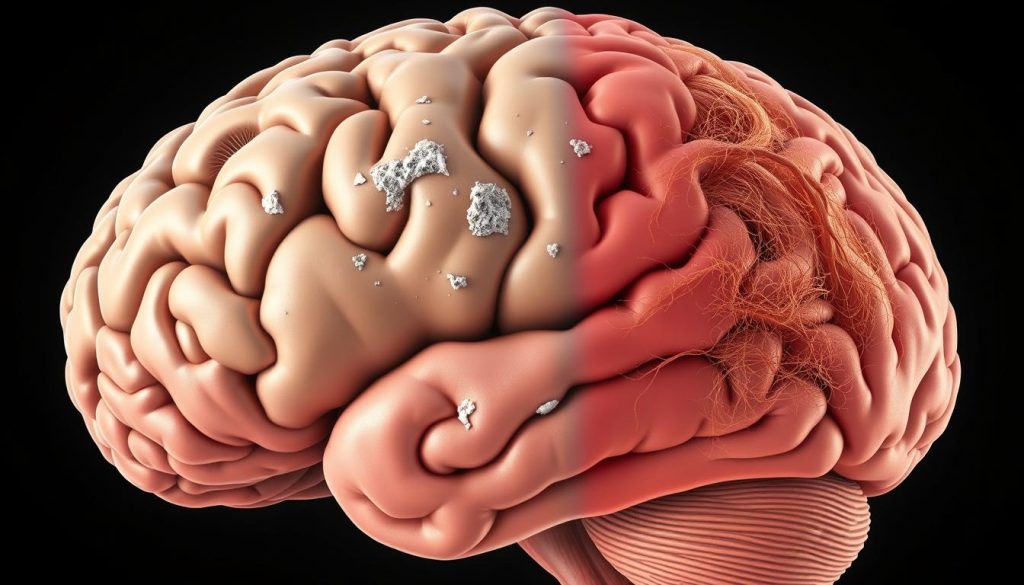
Alzheimer’s progresses through stages, each with its own set of symptoms. These symptoms come from changes in brain structure and chemistry. Over time, these changes worsen, leading to more severe symptoms.
| Stages of Alzheimer’s | Associated Brain Changes | Common Symptoms |
|---|---|---|
| Early Stage | Mild hippocampal atrophy | Memory lapses, confusion with time or place |
| Middle Stage | Widespread cortical atrophy | Difficulty with language, significant memory loss |
| Late Stage | Severe brain atrophy | Loss of ability to communicate, dependence on caregivers |
The brain changes in Alzheimer’s are mainly due to amyloid plaques and neurofibrillary tangles. These changes harm brain cells and connections, causing symptoms. In the late stages, the brain shrinks a lot.
Studying these brain changes helps us find ways to slow the disease. This could improve symptoms and quality of life for those with Alzheimer’s.
Managing Alzheimer’s Disease with Caregiving
Starting as a caregiver for someone with Alzheimer’s shows our strength and kindness. Every day, caregivers face new challenges as they care for loved ones with Alzheimer’s. Their dedication and understanding are key, making support and resources crucial for them.
Providing Daily Support and Comfort
Helping someone with Alzheimer’s involves many tasks, like managing meds and keeping them safe. Caregivers must balance their loved one’s needs with the disease’s effects. This role needs patience and empathy, as caregivers adapt to changing abilities and behaviors.
Navigating Challenges and Resources for Caregivers
Dealing with Alzheimer’s caregiving requires emotional strength and access to resources. Knowing when to ask for help is vital for sustainable care. There are many resources, like support groups and educational materials, to help caregivers manage stress and keep well.
FAQ
Q: What are the leading theories on what causes Alzheimer’s disease?
A: Alzheimer’s disease is still a mystery, but we think it’s a mix of genetics, environment, and lifestyle. Amyloid plaques and neurofibrillary tangles in the brain are key players.
Q: Can lifestyle changes reduce the risk of developing Alzheimer’s disease?
A: Yes, making healthy choices can help. Eat well, stay active, keep your mind sharp, and connect with others.
Q: What are the early signs and symptoms of Alzheimer’s disease?
A: Early signs include memory loss and trouble solving problems. You might also get confused about time or place. Mood changes are another sign.
Q: How do genetic factors influence the risk of developing Alzheimer’s disease?
A: Some genes raise your risk, especially the APOE-e4 gene. But having it doesn’t mean you’ll definitely get Alzheimer’s.
Q: Are environmental factors significant in the development of Alzheimer’s disease?
A: Environmental factors might play a role, like air pollution and pesticides. But a stimulating environment could help prevent cognitive decline.
Q: How important is diet in Alzheimer’s disease prevention?
A: Diet is crucial for brain health. Eating like a Mediterranean or DASH diet can help prevent Alzheimer’s.
Q: Does age increase the risk of Alzheimer’s disease?
A: Yes, age is the biggest risk factor. Most people with Alzheimer’s are over 65, and the risk grows with age.
Q: What are neurofibrillary tangles and amyloid plaques?
A: Neurofibrillary tangles are twisted tau protein inside neurons. Amyloid plaques are protein clumps between nerve cells. Both harm the brain.
Q: How do Alzheimer’s disease stages progress over time?
A: Alzheimer’s goes through stages from mild to severe. Early stages might have memory loss. Later stages lead to confusion and loss of communication skills.
Q: What treatment options are available for managing Alzheimer’s disease symptoms?
A: Treatments include medications and non-drug methods like therapy and exercise. Researchers are working on new treatments.
Q: What techniques are used to diagnose Alzheimer’s disease?
A: Diagnosis involves medical history, mental tests, and brain scans. Blood tests and cerebrospinal fluid analysis are also used.
Q: What are the recent advances in Alzheimer’s disease research?
A: Advances include better biomarkers for diagnosis and genetic research. New treatments are being tested to target the disease’s causes.
Q: What kind of brain changes occur in an Alzheimer’s patient?
A: Alzheimer’s patients’ brains shrink and lose nerve cells. Amyloid plaques and tangles form, causing cognitive decline and memory loss.
Q: What does effective Alzheimer’s caregiving involve?
A: Good caregiving means daily support and managing symptoms. It’s also about keeping the person safe and comfortable. Caregivers need support too.












